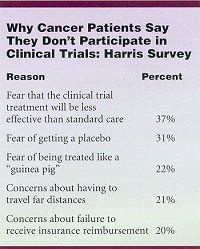Most Cancer Patients Say They Are Unaware of Clinical Trials Survey
NEW YORK-About 85% of cancer patients in a national survey said they were unsure or unaware of their possible eligibility to be in clinical trials, and 75% said they would have tried to enroll had they known.
NEW YORKAbout 85% of cancer patients in a national survey said they were unsure or unaware of their possible eligibility to be in clinical trials, and 75% said they would have tried to enroll had they known.
The Harris Interactive survey of approximately 6,000 cancer patients, as well as physicians and the general public, was sponsored by the Coalition of National Cancer Cooperative Groups Inc., Oncology Nursing Society, Cancer Leadership Council, and Cancer Research Foundation of America. The survey is the first in a series of polls that will examine the reasons for low enrollment in cancer clinical trials.

The survey also found that 71% of the cancer patients who are aware that they might be able to take part in trials do not try to enroll. The patients cited one or more reasons why they chose not to participate in a clinical trial (see Table).
The patients who did not participate were similar demographically to those who did participate in trials and had similar health insurance. But cancer patients who were not aware of clinical trials tended to be older, less affluent, and less well educated.
According to the study, the vast majority of those who have taken part in trials report having a positive experience. Ninety-seven percent said they were treated with dignity and respect, and that the quality of care they received was excellent or good. More than 80% said they did not receive more tests than they felt were necessary, and 86% said their treatment was covered by insurance.
Clinical trials represent the very best care we have to offer for many cancer patients, yet many do not take advantage of the opportunity because of lack of awareness or misconceptions of what a clinical trial really is, Robert Comis, MD, said at a press briefing to introduce the survey results. Dr. Comis is president of the National Cancer Cooperative Groups and group chair of the Eastern Cooperative Oncology Group.
Of all adult cancer patients, only 3% to 5% participate in clinical trials. Most patients simply do not know about clinical trials that could help them, he said.
Learning about the attitudes of patients, the public, and physicians, Dr. Comis said, will help the four sponsors of the current and upcoming polls develop a strategic plan for increasing the clinical trial participation of adult cancer patients. The goal, he said, is to have from 10% to 15% of all cancer patients take part in clinical trials.
The potential to meet this goal is there, Dr. Comis said. According to the survey, 8 of 10 Americans polled said that if they were diagnosed with cancer, they would be willing to participate in a clinical trial for their initial treatment. Almost 9 of 10 said that they would be willing to participate in a cancer clinical trial if their initial treatment failed. Most Americans would also be willing to participate in a clinical trial designed to prevent cancer.
The study also demonstrated that virtually all oncologists and an overwhelming majority of primary care physicians would like to see more of their own cancer patients participate in clinical trials and be given the opportunity to participate in clinical trials at different stages of treatment.
But the study also found that physicians did not uniformly encourage participation. The physicians cited patient reluctance, exclusion due to strict eligibility criteria, and the amount of paperwork associated with trial participation as inhibiting factors.
Correcting Misconceptions
Larry Norton, MD, head of Solid Tumor Oncology, Memorial Sloan-Kettering Cancer Center, said that patient misconceptions about clinical trials need to be corrected, most especially the notion that patients in the control arm of a trial might be given a placebo rather than standard care.
Nobody is getting shafted in phase III trials, Dr. Norton said. The very worst that can happen is they get the standard therapy, and theyre getting more than the standard therapy. Theyre getting carefully considered, carefully designed standard therapy, rigorously arranged and scrutinized by experts both within the institution and around the country, in some cases throughout the world, who are carefully looking at all the information and making sure that everything is done perfectly.
He said that the data clearly show that patients getting standard therapy in phase III clinical trial do better than patients getting standard therapy in the community setting.
Communicating information about cancer is always tricky, Dr. Norton said, never more so than in the doctors office at the time of diagnosis. For that reason, Dr. Norton questioned the validity of the surveys findings that 85% of patients said they were never told or did not know about the possibility of their taking part in cancer trials.
I have spent time with patients who dont remember a conversation a day or two later. Sometimes they shut off. We dont know what percentage in that study just didnt recall. Its nobodys fault. We just have to find better ways of communicating, Dr. Norton said.
Raising public understanding of clinical trials is a task that doctors and the larger society have to address, he said. If the population had a better general knowledge of the benefits of clinical trials, patients would automatically ask about them when they come to their doctors offices.